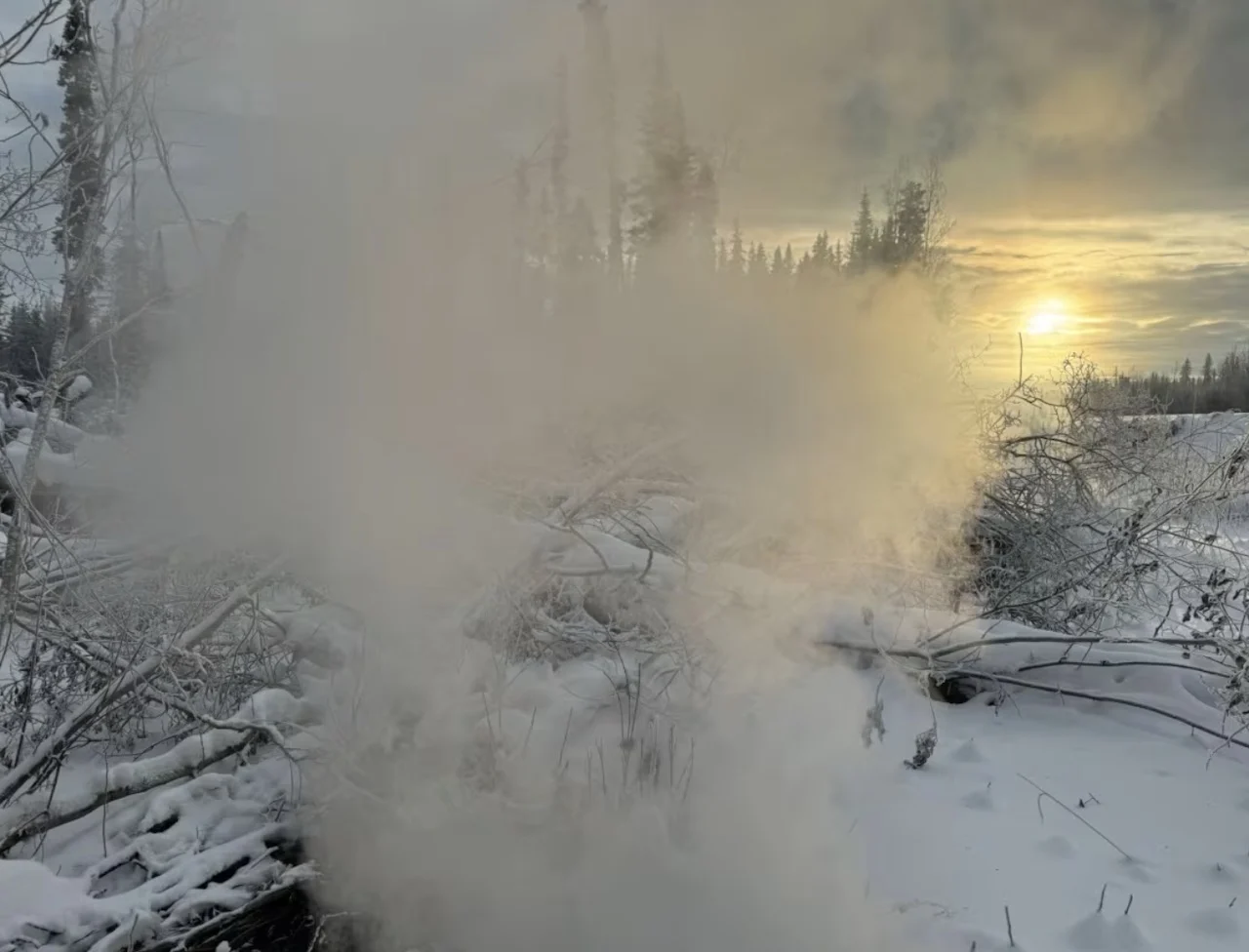PEAT BOGS AND MUSKEG

Published on Feb. 25, 2024
Aerial monitoring to begin early in spring, minister says
Fire officials in the N.W.T. say they'll bring in staff and resources earlier than usual this spring, to prepare for the coming wildfire season and also assess any fires still smouldering underground since last year.
"There's a plan to do aerial as well as drone scanning early in the spring as well as having staff on the ground also doing assessments on fires," said Jay Macdonald, minister of Environment and Climate Change, in the legislature on Wednesday.
Macdonald said climate change and drought conditions have shown the need to to be proactive when dealing with fires.
SEE ALSO: 'Holdover wildfires' from 2023 producing visible smoke again, says officials
One concern this year is that some of last year's fires are still burning beneath the snow and could flare up again in the spring. During the winter months, such fires can be noticed when smoke or steam appears to be coming out of the ground.
Macdonald said an over-wintering fire near Paradise Gardens, south of Hay River, N.W.T., raised concerns for residents there.
"There was significant smoke that was billowing from there," he said.
Content continues below

N.W.T. fire information officer Mike Westwick said fires last year burned deep into the soil, partly because of how dry it was. (CBC News)
N.W.T wildfire information officer Mike Westwick said that fire received "action," meaning that workers cut off the fire's supply to oxygen, smothering it.
Westwick said there isn't an exact number of how many holdover fires there are in the N.W.T., but monitoring is focused on areas around Enterprise, the Hay River corridor, and Highway 3 between Behchokö and Yellowknife.
Westwick said it's not uncommon to see over-wintering after a heavy wildfire season. He said fires last year burned deep into the soil, partly because of how dry it was.
Visit The Weather Network's wildfire hub to keep up with the latest on the 2024 wildfire season across Canada.
"That heat stays trapped in there and with some ignition still underground there, you know, working with what it's got with diminished oxygen," he said, adding that material such as peat moss can fuel such fires.
Westwick said firefighters are being trained to deal with holdover fires, and aircraft are also being lined up to deal with those fires and prepare for any new ones that might start up in the coming season.
Content continues below
He said he recognized the concern from residents, especially those who went through a traumatic fire season last year. But Westwick said that the over-wintering fires themselves are not a risk for communities right now.
Tied to climate change, researcher says
Jennifer Baltzer, a professor at Wilfrid Laurier University who has been studying holdover fires, said it's all tied to the changing climate.
"We're seeing more severe fires, we're seeing larger area burned," she said.
Baltzer said over-wintering fires can mean an earlier start to the wildfire season, which could put additional strain on firefighting resources. Such fires can also affect carbon emissions, and forest recovery.

A holdover fire this winter near Fort Nelson, B.C. Such fires smoulder underground during winter months and can reignite in the spring. (Submitted by Sonja Leverkus)
"The impact of these will be relatively small compared to the main fire season," she said. "But again, the bigger concern probably has to do with how this is extending the fire season."
According to the most recent water monitoring bulletin, it could be another dry summer in the territory. So far, data shows that there's been a lot less snow than usual in the areas of northern Alberta and B.C. that drain into the N.W.T.
Westwick said the speed of the spring melt also has an effect.
"A longer, more drawn-out melt can be beneficial, in terms of making sure that the ground is wetter and colder for longer — therefore not providing as good of an environment for wildfires to thrive," he said.
"A faster melt will result in faster evaporation, which results in drier ground, which results in greater levels of fire danger."
The territorial government is currently holding wildfire engagement sessions where residents can give feedback on wildfire management, both in person and online.
And on Thursday, MLAs voted for a public inquiry into the territory's response to the 2023 wildfires, though Premier R.J. Simpson said his government is making no promises about that.

Published on Feb. 25, 2024
Aerial monitoring to begin early in spring, minister says
Fire officials in the N.W.T. say they'll bring in staff and resources earlier than usual this spring, to prepare for the coming wildfire season and also assess any fires still smouldering underground since last year.
"There's a plan to do aerial as well as drone scanning early in the spring as well as having staff on the ground also doing assessments on fires," said Jay Macdonald, minister of Environment and Climate Change, in the legislature on Wednesday.
Macdonald said climate change and drought conditions have shown the need to to be proactive when dealing with fires.
SEE ALSO: 'Holdover wildfires' from 2023 producing visible smoke again, says officials
One concern this year is that some of last year's fires are still burning beneath the snow and could flare up again in the spring. During the winter months, such fires can be noticed when smoke or steam appears to be coming out of the ground.
Macdonald said an over-wintering fire near Paradise Gardens, south of Hay River, N.W.T., raised concerns for residents there.
"There was significant smoke that was billowing from there," he said.
Content continues below

N.W.T. fire information officer Mike Westwick said fires last year burned deep into the soil, partly because of how dry it was. (CBC News)
N.W.T wildfire information officer Mike Westwick said that fire received "action," meaning that workers cut off the fire's supply to oxygen, smothering it.
Westwick said there isn't an exact number of how many holdover fires there are in the N.W.T., but monitoring is focused on areas around Enterprise, the Hay River corridor, and Highway 3 between Behchokö and Yellowknife.
Westwick said it's not uncommon to see over-wintering after a heavy wildfire season. He said fires last year burned deep into the soil, partly because of how dry it was.
Visit The Weather Network's wildfire hub to keep up with the latest on the 2024 wildfire season across Canada.
"That heat stays trapped in there and with some ignition still underground there, you know, working with what it's got with diminished oxygen," he said, adding that material such as peat moss can fuel such fires.
Westwick said firefighters are being trained to deal with holdover fires, and aircraft are also being lined up to deal with those fires and prepare for any new ones that might start up in the coming season.
Content continues below
He said he recognized the concern from residents, especially those who went through a traumatic fire season last year. But Westwick said that the over-wintering fires themselves are not a risk for communities right now.
Tied to climate change, researcher says
Jennifer Baltzer, a professor at Wilfrid Laurier University who has been studying holdover fires, said it's all tied to the changing climate.
"We're seeing more severe fires, we're seeing larger area burned," she said.
Baltzer said over-wintering fires can mean an earlier start to the wildfire season, which could put additional strain on firefighting resources. Such fires can also affect carbon emissions, and forest recovery.

A holdover fire this winter near Fort Nelson, B.C. Such fires smoulder underground during winter months and can reignite in the spring. (Submitted by Sonja Leverkus)
"The impact of these will be relatively small compared to the main fire season," she said. "But again, the bigger concern probably has to do with how this is extending the fire season."
According to the most recent water monitoring bulletin, it could be another dry summer in the territory. So far, data shows that there's been a lot less snow than usual in the areas of northern Alberta and B.C. that drain into the N.W.T.
Westwick said the speed of the spring melt also has an effect.
"A longer, more drawn-out melt can be beneficial, in terms of making sure that the ground is wetter and colder for longer — therefore not providing as good of an environment for wildfires to thrive," he said.
"A faster melt will result in faster evaporation, which results in drier ground, which results in greater levels of fire danger."
The territorial government is currently holding wildfire engagement sessions where residents can give feedback on wildfire management, both in person and online.
And on Thursday, MLAs voted for a public inquiry into the territory's response to the 2023 wildfires, though Premier R.J. Simpson said his government is making no promises about that.
No comments:
Post a Comment